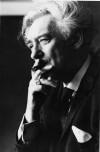Maurice Gilliams

Maurice Gilliams
In 1936 Gilliams’ Elias of het gevecht met de nachtegalen (Elias or the Struggle with the Nightingales) had ushered in a new, strongly suggestive way of writing and a novelistic structure based on the fugue. The critics called the book a “melting pot of genres” : Gilliams’ prose is close to poetry and driven by what he himself called “an essayistic motivation”. His diaries, which were published in his lifetime, also reveal that Gilliams was one of the first writers in Flanders or the Netherlands to obsessively address the question “what is writing?”. His entire oeuvre is contained in just one volume, a book he entitled Vita Brevis: “short life” in Latin, suggesting the wish for an ars longa, a “lasting art”.
Writing in the context of international Modernism, Maurice Gilliams’ work has been influenced by and compared to that of Rainer Maria Rilke, especially to the concrete images of the latter’s New Poems, the poetic prose of The Notebooks of Malte Laurids Brigge (for Gilliams’ novel Elias), and Rilke’s poems in The Life of Mary. Gilliams produced a cycle of poems with the same title and used Biblical imagery to solidify the relation between love, sensuality, and the experience of the metaphysical. Other comparisons have been made between Gilliams and German Expressionists such as Georg Trakl, Gottfried Benn, and his fellow countryman, Paul van Ostaijen. French influences include the cerebral Paul Valéry and Stéphane Mallarmé, in their attempts to replace life with art. However, Gilliams’ poetry never becomes abstract and the ‘confessional’, self-baring nature of his work is essential.
The son of a Flemish printer and a French-speaking mother from an old bourgeois family, Gilliams grew up bilingually. He decided that Dutch suited his poetic purpose best, which was to isolate fragments of a life in words that were personal and detached at once, hard and true like stones. Like his father, Maurice Gilliams first earned a living as a printer, then became a teacher of typesetting and calligraphy, librarian for the Royal Museum of Fine Arts at Antwerp, and, finally, director of the Flemish Academy of Dutch Language and Literature.
Generally, Gilliams’ mode is simple — even when grand and archaic, precise, and solemn. The early poems in particular are influenced by Expressionist painting in their colourful images that project a feeling of being torn between vitality and nostalgia. Many of Gilliams’ poems are determined by what was lost, was never had, or came too late: youth, parents, love, a child, a dream of perfection. The background often recalls the Flemish countryside which in the poet’s imagination becomes a barren wasteland, a site of melancholy and desertedness. In other poems, the urban environment of Antwerp is present as a location of death and decay. The later poems highlight the theme of fruitlessness — in life and in poetry. Yet there is an existentialist kind of acceptance, a toughness when facing an inescapable fate.
Formally, besides the directness of presentation inspired by the visual arts, the unusual images in Gilliams’ poems are underscored by internal sound patterns. While often using the sonnet form in his later poetry, Gilliams does not apply traditional rhyme schemes but relies on the effects of associative, swaying sound. Equally in many of his quatrains the rhyme is irregular and is frequently slightly off. Assonance instead of strict end rhyme gives many of the images and metaphors a sense of ambiguity, a lack of finality, and calls for eternal rereading and reinterpretation.
Gilliams’ sixty-eight poems and his entire body is work are part of the painful and obsessive effort to uncover and preserve his true self. The ultimate goal of his endeavors was to create a “lyrical autobiography”, a still portrait in the sea of life. It was to be a permanent document of himself in the perfect form of the words on paper. The pessimistic understanding of the inevitable failure of his life project leaves a mark of sadness on the very limited number of texts Gilliams selected to ‘remain’. Yet the message is here; and the water keeps flowing.
Selected Bibliography
Poetry
Landelijk solo (1927) in Verzamelde gedichten, Meulenhoff, Amsterdam,1993
Eenzame vroegte (1928) in Verzamelde gedichten, Meulenhoff, Amsterdam,1993
De flesch in zee (1929) in Verzamelde gedichten, Meulenhoff, Amsterdam,1993
Het Maria-leven (1933) in Verzamelde gedichten, Meulenhoff, Amsterdam,1993
Het verleden van Columbus (1933) in Verzamelde gedichten, Meulenhoff, Amsterdam,1993
Verzen (1936) in Verzamelde gedichten, Meulenhoff, Amsterdam,1993
Tien gedichten (1954) in Verzamelde gedichten, Meulenhoff, Amsterdam,1993
Bronnen der slapeloosheid (1958) in Verzamelde gedichten, Meulenhoff, Amsterdam,1993
Gedichten 1919-1958 (1965) in Verzamelde gedichten, Meulenhoff, Amsterdam,1993
Prose
Oefentocht in het luchtledige (1933) in Vita brevis, Meulenhoff, Amsterdam,1984
Elias of het gevecht met de nachtegalen (1936) in Vita brevis, Meulenhoff, Amsterdam,1984
De man voor het venster (1943) in Vita brevis, Meulenhoff, Amsterdam,1984
Een bezoek aan het prinsengraf, essay over de dichter Paul van Ostaijen (1952) in Vita brevis, Meulenhoff, Amsterdam,1984
Winter te Antwerpen (1953) in Vita brevis, Meulenhoff, Amsterdam,1984
De kunst van de fuga (1953) in Vita brevis, Meulenhoff, Amsterdam,1984
Translations
Poetry
The Bottle at Sea: Complete poems and Journal Fragments (English), Green Integer, Los Angeles, 2006
Elegie Fiamminghe (Italian), Mobydick, Faenza,1994
Poèmes (French), Henry Fagne, Bruxelles, 1966
Prose
Elias or The Struggle with the Nightingales (English), Sun &Moon Press, Los Angeles, 1995
Der Mann am Fenster (German), Verlag Bibliotheca Christiana, Bonn,1967
Winter in Antwerpen (German) Verlag Bibliotheca Christiana, 1964
Elias oder das Gefecht mit dem Nachtigallen: 1930-1935 (German) Bibliotheca Christiana,1964 /Wagenbach, 1997
L’inverno ad Anversa (Italian), Carte Segrete, Roma, 1968
Elias ou le combat contre les rossignols suivi de Monsieur Albéric (French), Librairie des Arts, Antwerp, 1968
L ‘hiver à Anvers (French) Librairie des Arts, Antwerp, 1965
Links
Information about Maurice Gilliams in the Digital Library of Dutch Literature (in Dutch).
An essay on Maurice Gilliams’ novel Elias (in English).
The works of Maurice Gilliams are published by Meulenhoff (in Dutch).
Maurice Gilliams on Lyrikline.
Sponsors
























